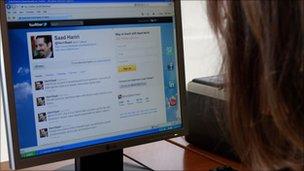Associated Press reporters told off for tweeting
- Published

People are increasingly turning to Twitter for breaking news
Associated Press has reprimanded some of its journalists for breaking news on Twitter before posting it on the wires.
The news agency issued the warning after some staff members tweeted that AP journalists had been arrested at the Occupy Wall Street camp in Manhattan.
An email from bosses followed reminding staff about AP's social media policies.
The incident has reopened a debate about how traditional media deal with the disruptive nature of social networks.
Twitter has become a breaking news service for many people but it lacks the traditional outlets' reputation for accuracy. Because anyone can break stories on the platform they do not always turn out to be correct.
While Twitter is an invaluable tool in newsrooms around the world, it has also forced news organisations, including AP, to draw up strict rules.
"If you have a piece of information, a photo or a video that is compelling, exclusive and/or urgent enough to be considered breaking news, you should file it to the wire, and photo and video points before you consider putting it out on social media," the AP policy reads.
After the recent incident in New York, AP's managing editor Lou Ferrara wrote an email to employees explaining that their first duty was to the agency not Twitter.
And executive editor Kathleen Carroll issued a memo, external saying much of the resulting "chatter" had missed the point.
"When we lose contact with a journalist, our main focus is making sure they are safe, no matter where they are. Sometimes, talking about it while things are still uncertain can endanger them," she said.
"It's not outlandish to think that a tweet that's taken by someone in authority to be opinionated or sarcastic could lead to one of our staffers being held longer than necessary."
She added that AP policies on using Twitter and other social media platforms were there "for good reasons".
Extinction
But Anthony de Rosa, social media editor at Reuters, thinks that such policies may need to be overhauled.
He tweeted: "News agencies must evolve or face extinction."
He expanded the point in his official Reuters blog.
"The wire is still a huge part of our business and always will be. However, acting in a way that handcuffs us from doing our best work on Reuters.com and on social networks, which help drive traffic and extend our brand, is writing a death sentence for us as a future media company.
"To bury our head in the sand and act like Twitter (and who knows what else comes into existence next month or five years from now?) isn't increasingly becoming the source of what informs people in real-time is ridiculous," he wrote.
One of the biggest issues that corporations have to face is that Twitter and Facebook are used by employees for both personal and professional reasons.
Mr de Rosa believes this can improve news agencies' brands.
"Part of having your journalists on these platforms is giving them the freedom to be a normal human being, not a robot, a PR machine or a slave to the wire," he blogged.
Caroline Kean, a partner with law firm Wiggin, thinks social media policies need to take into account that people are writing on such platforms as both professionals and individuals.
"Employees of a news organisation have an obligation to break stories via their employer rather than to the world at large and it is easy to see that if a company's whole business model is built on breaking news then doing that on Twitter undermines that business," she said.
But if there are also personal reasons for tweeting, such as journalists being arrested, then common-sense can be applied.
"It is possible to write a personal tweet while protecting the agency story," she said.
The BBC has also had to consider the issue.
News website editor Steve Herrmann said: "We have guidance on the personal use of social media, for example staff should be careful that the information disclosed or opinions expressed do not bring the BBC into disrepute. It is based on common sense, and could almost be boiled down to 'Don't do anything stupid'".
Cruel hoax
Mr Herrmann believes news organisations need to raise their game.
"I think the speed and immediacy of Twitter is something newsrooms are still coming to terms with. In BBC News we are looking at how to make sure we have the best systems to ensure our reporting is available as fast as possible across all our services, whilst maintaining our commitment to accuracy, and Twitter is certainly forcing the pace," said Mr Herrmann.
The corporation aims to get breaking news on both platforms at the same time although some stories, including exclusives by the BBC's business correspondent Robert Peston, have appeared on Twitter first.
Social media networks have proven their ability to distribute news at speed. Michael Jackson's death, for example, was widely reported on Twitter some time before traditional media caught up.
But reporting the deaths of celebrities carries its own health warning.
Earlier this month tweets began to spread about the death of Radio Clyde DJ Tiger Tim Stevens.
Eventually the DJ himself tweeted that he was "alive and well" and that the original tweet had been a "cruel hoax" that was particularly upsetting for his 91-year-old mother.
- Published17 November 2011
- Published16 November 2011
- Published15 November 2011